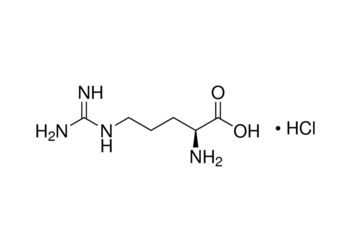L-Arginine Mono Hydrochloride 99% (For Biochemistry)
₹ 255.00 – ₹ 3,250.00Price range: ₹ 255.00 through ₹ 3,250.00
Product Specifications
CAS NO. 1119-34-2
HSN CODE : 29224990
- Molecular Formula: C₆H₁₄N₄O₂·HCl
- Molecular Weight: 210.66 g/mol
- Appearance: White crystalline powder
- Purity: ≥99% (biochemistry grade)
- Solubility: Highly soluble in water; slightly soluble in ethanol.
- pH (1% solution): Approximately 5.0–7.0
HealthChemix Support
GST Invoice Available
Secure Payments
365 Days Help Desk
Return & Warranty Policy
Product Details
L-Arginine Mono Hydrochloride 99% (For Biochemistry) / CAS NO. 1119-34-2
L-Arginine Mono Hydrochloride is the hydrochloride salt of L-arginine, a naturally occurring amino acid. This compound is widely used in biochemistry, pharmaceutical research, and industrial applications due to its high purity and critical role in various biological processes. The CAS Number 1119-34-2 uniquely identifies it in chemical databases.
Chemical and Physical Properties
- Molecular Formula: C₆H₁₄N₄O₂·HCl
- Molecular Weight: 210.66 g/mol
- Appearance: White crystalline powder
- Purity: ≥99% (biochemistry grade)
- Solubility: Highly soluble in water; slightly soluble in ethanol.
- pH (1% solution): Approximately 5.0–7.0
Applications of L-Arginine Mono Hydrochloride
1. Biochemical Research
L-Arginine mono hydrochloride is extensively used in biochemical studies due to its role as a precursor for various metabolic pathways:
- Nitric Oxide (NO) Biosynthesis: L-arginine is the substrate for nitric oxide synthase (NOS) enzymes, producing nitric oxide, which is critical for vascular relaxation and signaling.
- Protein Synthesis: As a proteinogenic amino acid, it contributes to protein formation in living organisms.
- Urea Cycle: L-arginine plays a crucial role in detoxifying ammonia through the urea cycle.
2. Pharmaceutical Applications
L-Arginine mono hydrochloride is used in the pharmaceutical industry for its physiological benefits:
- Cardiovascular Health: It is utilized in research for its role in improving blood flow, treating hypertension, and preventing cardiovascular diseases.
- Wound Healing: L-arginine supports tissue repair and collagen production, making it a candidate for studies on wound healing.
- Immune Function: It serves as a precursor for polyamines, which are essential for cell proliferation and immune function.
3. Cell Culture and Biotechnology
L-arginine mono hydrochloride is a key ingredient in cell culture media. It provides an essential nutrient for cell growth and supports the metabolic processes of cultured cells in biotechnology research.
4. Nutraceuticals
Although primarily used for biochemistry, its role in nutritional supplements for enhancing athletic performance and improving vascular health is of interest for pharmaceutical-grade applications.
Mechanisms of Action in Biochemistry
- Precursor for Nitric Oxide (NO):
L-arginine is metabolized by nitric oxide synthases (NOS) to produce nitric oxide and citrulline. NO acts as a signaling molecule involved in vasodilation, neurotransmission, and immune defense mechanisms. - Role in the Urea Cycle:
L-arginine helps convert toxic ammonia into urea, which is excreted from the body. This process is critical for maintaining nitrogen balance. - Synthesis of Creatine:
L-arginine, in combination with glycine and methionine, participates in creatine synthesis, an important molecule for cellular energy storage.
Safety and Handling
L-arginine mono hydrochloride is generally considered safe for laboratory and industrial use when handled properly.
- Toxicity: Low toxicity when used in appropriate concentrations.
- Handling Precautions: Avoid inhalation, ingestion, and skin or eye contact. Use personal protective equipment (PPE), including gloves and goggles, when handling the compound.
- Storage: Store in a cool, dry place, away from light and moisture, to maintain stability.
Conclusion
L-Arginine Mono Hydrochloride 99% (CAS NO. 1119-34-2) is a highly versatile compound essential for biochemical research, pharmaceutical studies, and biotechnological applications. Its roles in nitric oxide production, protein synthesis, and the urea cycle make it indispensable in understanding and enhancing metabolic and physiological functions.
Other Product
Related products
-
Barium Oxide
₹ 7,200.00Original price was: ₹ 7,200.00.₹ 7,000.00Current price is: ₹ 7,000.00. This product has multiple variants. The options may be chosen on the product page -
Ajowan Oil
₹ 700.00 – ₹ 2,800.00Price range: ₹ 700.00 through ₹ 2,800.00 This product has multiple variants. The options may be chosen on the product page




